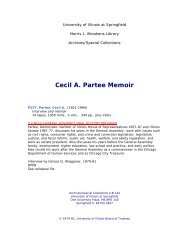Gerald W. Smith Memoir - University of Illinois Springfield
Gerald W. Smith Memoir - University of Illinois Springfield
Gerald W. Smith Memoir - University of Illinois Springfield
You also want an ePaper? Increase the reach of your titles
YUMPU automatically turns print PDFs into web optimized ePapers that Google loves.
<strong>Gerald</strong> W. SrriLth<br />
Was this in any way a controversial question?<br />
A. Yes, it was a controversial question. Of course, those were t& days<br />
<strong>of</strong> the evolution trial. We had chapel at Knox, w &shrran year,<br />
chapel every day just before lunch. Then, after nly f'reshrran year,<br />
was changd to three days a week and chapel attendance was mdato<br />
Faculty mrrS3ers spoke, and I recall all three years in chapel, two peeches<br />
t<br />
each year. One by Dr. Longdon, the physics pr<strong>of</strong>essor <strong>of</strong> whom I spe , and<br />
one whose nam escapes at the moment, but who tawt the courseqin<br />
Bible, old and new testament. Each year each <strong>of</strong> them mde a speech, Long-<br />
don accepting the evolution theory and the other pr<strong>of</strong>essor trying to ex-<br />
pound the literal translation <strong>of</strong> the story <strong>of</strong> Genesis. Dr. Longdon would<br />
come in to say that the evolutionary process cam along and he would quote<br />
the Bible to the effect that a day was as a thousand years in the si@t <strong>of</strong> .<br />
God and, therefore, each <strong>of</strong> those evolutionary things spelled out in Genesis<br />
as happening in seven days srd&t have taken eons. Whereas, the other pro-<br />
fessor would corn and insist that that was seven calendar days. It was<br />
not a bitter struggle, but yes, the evolutionary trials were followed with<br />
considerable interest . , ,<br />
Q. Well now, did this kind <strong>of</strong> conflict set <strong>of</strong>f reverberations in the<br />
minds <strong>of</strong> the students?<br />
A. No, no, student bodies in 1924 to 1928 were not the activists <strong>of</strong> today.<br />
Student bodies were mre passive as far as that part <strong>of</strong> it goes. No, we<br />
sat around and chatted about this thing and that and talked about it, but<br />
so far as there being any organizations fomd or strong editorials in the<br />
papers, school paper and so forth, no, Knox was not that kind <strong>of</strong> a . . .<br />
Q. Knox at that tirre, in Galesburg was fairly well insulated, I guess, f'rom<br />
much <strong>of</strong> the mainstream <strong>of</strong> life, it would have gotten newspapers, I guess,<br />
but I don't know. Was that so?<br />
A. No, I don't think so, I think we were pretty weil tuned in to the dnstream<br />
<strong>of</strong> life and I think we had a faculty <strong>of</strong> scholars, and <strong>of</strong> people with<br />
broad eno& Interests and who were active enough in m y <strong>of</strong> their fields.<br />
There were a rimer <strong>of</strong> such-Dr. Con~r, <strong>of</strong> whom I speak, was strongly<br />
active in the political domain. He had once been the myor <strong>of</strong> Gale burg<br />
and Pr<strong>of</strong>essor Kern, who was the chairnen <strong>of</strong> the Modern Languages De$artmnt<br />
was a man who was very active in all <strong>of</strong> the political and socia mvemnts<br />
<strong>of</strong> the day and who traveled as a lecturer in those Melds and was<br />
fairly wel-hown .<br />
Q. So Knox encouraged this kind <strong>of</strong> thing.<br />
A. Yes, and Pr<strong>of</strong>essor Curtis, who was the chaim <strong>of</strong> the Depar*tmnt <strong>of</strong><br />
Business and EconomLcs was a well-known scholm in the field and was tuned<br />
in with many <strong>of</strong> the developmnts <strong>of</strong> the day. DuTeng fYeshrran year at<br />
Knox, Dr. McConahey, who had been the president for flve or six years be-<br />
fore I went there, resigned to becorns the president <strong>of</strong> Weslegan College in<br />
Connecticut and subsequently becm the governor <strong>of</strong> Connecticut. He had<br />
this kind <strong>of</strong> a flavor. His successor, Dr. Albert Britt, who was the

















